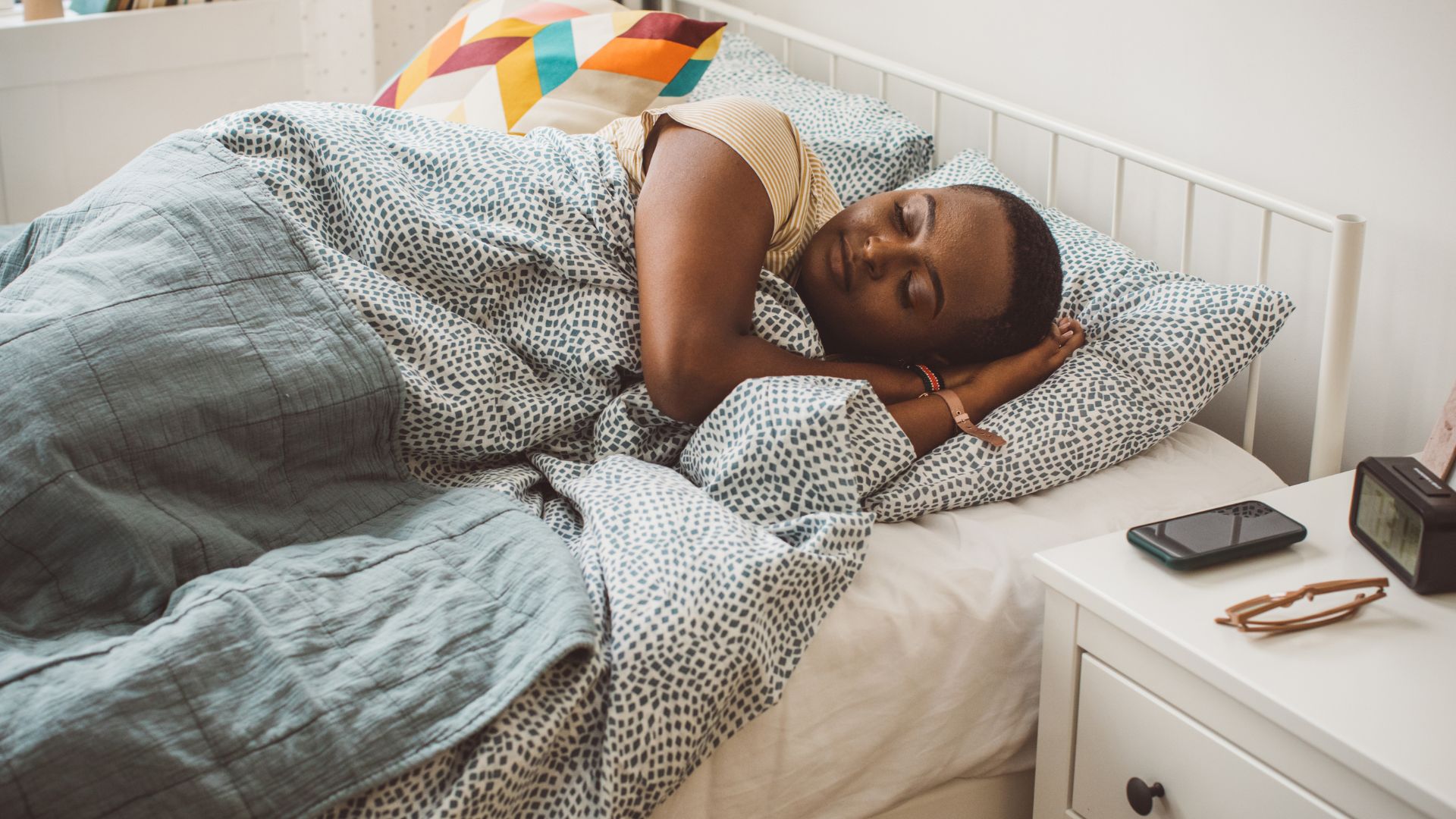A step-by-step guide to managing your sleep in the first semester of college (and improving it after that!)

That heady first semester of college is imbedded in most students’ memories for many reasons; the experience of co-habiting in a dorm with strangers who often become lifelong friends, the many parties that lead to many drinks and TK bedtimes, and the all-nighters in the library or your dorm room as you juggle the actual study with all the fun.
One thing you’re unlikely to remember a lot of is sleep (even if you did invest in one of the best mattresses for your dorm room). With so much going, the chances of slumber being a top priority for new college students are understandably slim, even though good sleep is vital to your health and your grades.
So, as a new cohort of college arrivals embark on their first semester, we’re here to help. We’ve spoken to an expert for advice on how much sleep college students need, for a step-by-step guide to managing your sleep those first few months and how to improve your sleep once you’ve settled in.
How much rest should college students be getting each night?
“Sleep is a necessity, not a luxury! Your top performance — academic, athletic, and emotional health — depends on adequate sleep,” says Dr. Marjorie Jenkins, Chief Clinical Officer at Incora Health, who are behind the soon-to-be-released Incora Smart Earrings, which track health metrics (including sleep) and analyze that data based on your menstrual cycle.
“During sleep, your brain consolidates memories, processes new information, and restores physical and mental energy essential for learning and peak performance,” she says.
So what does this translate to in terms of the hours of sleep college students should be clocking up each night? Dr. Jenkins says they should “aim to get between seven and nine hours of sleep per night,” advice that is in line with the recommended amount of sleep, in general, for healthy adults each night.
“This helps avoid daytime drowsiness, altered mood states, weight gain, poor health, and low energy. Unlike common myths, you can’t ‘catch up’ on sleep! Maintaining a steady sleep schedule is essential while balancing academics, social life, and being away from home for the first time!”
But how much are they getting in reality?
While we don’t want to depress you if you’re about to head off to college for the first time, it is better to be armed with the facts.
One paper published in Nature and Science of Sleep looking at the reasons behind sleepiness in college students noted that of 70% attain insufficient sleep (less than 8 hours a night). Dr. Jenkins also points to data that shows college students typically sleep for roughly seven hours per night.
“These statistics contribute to the daytime sleepiness, sleep deprivation, and irregular sleep schedules that are highly prevalent among college students,” she says. “While many students track their academic performance meticulously, few pay attention to the foundational health metric that enables that performance: quality sleep.”
Why might sleep be challenging during the first semester of college?
The first semester of college, when young people are often away from home for the first time, developing their own routines and habits, creates “a perfect storm of sleep disruption factors that specifically make it harder to fall asleep,” Dr. Jenkins says.
However, she explains that, “this freedom is coupled with heightened stress, anxiety, new environmental factors, and demanding social and academic schedules.”
And, as we mentioned above, the practice of pulling all-nighters ahead of tests or when a paper is due, is common among students, particularly if you’re juggling classes with a job and socializing. Even if, as Dr. Jenkins points out, it shouldn’t be.
“[Pulling all-nighters] disrupts your thought process and ultimately negatively impacts your recall performance,” Dr. Jenkins says, noting that it can impact health too, including causing cortisol levels, blood pressure, and blood sugar to rise.
It’s useful to be aware of exactly what may be impacting your sleep as a student (or, if you’re reading this as a parent of a student), and Dr. Jenkins explains that causes of sleep disruption at college can include factors such as “juggling coursework, assignments, exams, and long hours of studying,” as well as use of substances such as energy drinks and alcohol, which “disrupt natural sleep architecture and recovery processes.”
Plus, there’s dorm living, which can mean “noise disruptions, irregular roommate schedules, and social pressure to participate in late-night activities that interfere with healthy sleep patterns,” and “late-night screen time, digital multitasking, and media consumption [which] are strongly linked to shorter, poorer, and more disrupted sleep among adults.”

A step-by-step guide to managing your sleep in your first semester
It might be challenging to get the best sleep during your first semester of college, but there are steps you can take to help improve your rest during this exciting time. Here, Dr. Jenkins explains what they are…
1. Prioritize sleep quality over quantity
“When you can’t get 8-9 hours, make the sleep you do get count. Keep your room cool, dark, and quiet,” says Dr. Jenkins.
Maintaining a cooler room temperature of 65 to 70°F (18 to 21°C) for sleep, investing in ear plugs designed to be worn to bed if (or, more likely, when) your dorm is noisy, and considering a sleep mask (which doesn’t have to be high-tech) to block out unwanted light are all ways to achieve this on a student budget.
Creating this kind of healthy sleep environment, as Dr. Jenkins advises, is going to help you avoid disruptions to the slumber you are getting.
“Even six hours of deep, uninterrupted sleep is better than seven hours of fragmented rest,” she explains.
2. Create non-negotiable sleep windows

It may feel like you don’t have time to think during your first semester of college, let alone plan for sleep. But creating boundaries to ensure you’re getting at least some rest is important, says Dr. Jenkins.
“Even with a chaotic schedule, establish minimum sleep boundaries,” she advises. “For example: ‘No matter what, I’m in bed by 2am and up by 8am.'”
Doing so, Dr. Jenkins notes, means that you’ll consistently be getting six hours of sleep each night, rather than fluctuating between nights when you only get three hours and others where you may get as much as nine.
“Having this consistent routine is essential for your hormonal cycle to enter REM and reach deep rest,” she explains.
In fact, recent research from 2024 has indicated that sleep regularity may be a stronger indicator of health and mortality than amount of sleep we get (though that isn’t to say getting enough sleep isn’t important!).
The study found that “higher sleep regularity was associated with a 20%-48% lower risk of all-cause mortality,” which is all the more reason to stick to sleep boundaries we mention above.
3. Use light wisely
Most college students will be familiar with mornings spent in bed recovering from nights out, or simply making the most of not having an early class. But doing the opposite; getting out into natural sunlight, is better for your sleep.
“Get bright light exposure first thing in the morning and throughout the day. This helps maintain your circadian rhythm even when bedtimes are inconsistent,” advises Dr. Jenkins.
As well as keeping your body clock on track, which in itself leads to better sleep, a recent study found that participants who got their daily dose of sunlight in the morning were able to drift off more quickly after getting into bed and woke up less during the night.
Using light (or lack of it!) to signal your body and mind that it’s time to sleep is also important.
“Dim lights 1-2 hours before your intended sleep time,” says Dr. Jenkins.
This is going to help you sleep because darkness triggers the release of melatonin, the ‘sleepy hormone’. Plus, doing so consistently means that it becomes part of your nighttime routine, which is a series of activities that help relax you and prepare you for rest.
4. Exercise for better sleep

Research shows that getting regular exercise leads to “improved sleep quality, reduced sleep latency, and better overall sleep quality.”
But it’s understandable that students may not feel it’s possible to keep up with gym classes on top of all their other commitments.
Luckily, “even 20 minutes of walking or light exercise daily can improve sleep quality significantly,” Dr. Jenkins says.
And, good news for students who are feeling overwhelmed by their busy schedules; exercising outdoors was shown, in one study, to reduce stress. Taking a short walk on your campus park or in one near your dorm is an easy way to see if this works for you, too.
“The key is accepting that the first semester won’t be perfect while still maintaining some healthy boundaries. Focus on consistency where possible and damage control where it’s not,” Dr. Jenkins adds.
How can you improve your sleep once you’re settled at college?
“One long-term sleep improvement strategy is using sleep tracking data to help identify your personal sleep patterns and optimal sleep window. Understanding your personal patterns can help students structure their schedules more effectively,” Dr. Jenkins says.
If you don’t already use a sleep tracker, our guide to 5 budget-friendly trackers, selected with students in mind, can help you decide which type may be most suited to you.
Dr. Jenkins suggests that hormonal tracking is particularly helpful for female students when it comes to predicting when their sleep may prove more challenging.
“During key parts of your cycle, you might need more sleep and rest! Understanding these patterns allows you to plan accordingly,” she explains.
If you’re a college student who is trying to get the best sleep but feeling like it’s impossible in the face of academic and social responsibilities, it’s important not to be too hard on yourself.
“Recognize that college sleep challenges are largely systemic and environmental, not personal failures,” Dr. Jenkins advises.
“By combining practical sleep hygiene strategies with data from hormonal and sleep tracking, students can develop personalized approaches that work within the realities of college life while still prioritizing this critical aspect of their health and academic performance,” she says.
Source link

